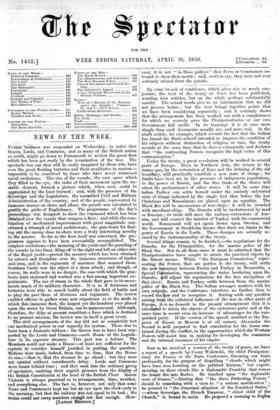By some breach of confidence, which gives rise to much
con- jecture, the text of the treaty of Paris has been published, wanting four articles, but on the whole perhaps substantially correct. The actual words give us no information that we did not possess before ; but the text brings together points that we have been considering separately ; and it certainly shows that the arrangement has been worked out with a completeness for which we scarcely gave the Plenipotentiaries or our own. Government full credit. In its language it is at once more simple than such documents usually are, and more real. In the- ninth article, for example, which records the fact that the Sultan' has issued the Hatti-scherif intended to improve the condition of his subjects without distinction of religion or race, the treaty records at the same time that he does so voluntarily and declares that " the contracting Powers recognize the high value of this communication."
-Under the treaty, a great revolution will be worked in several, parts of Europe. Even in Northern Asia, the return to 'the status .quec by the restoration of Kars and the defining of the old. bounliary, will practically establish a new state of things ; for' limibi have been set, in the presence of indigenous populations, to the power of Russia, and the free trade of the shores attest the predominance of other states. It will be some time before Turkey can settle herself under the entirely subverted. state of things indicated by the single fact that before the law Christians and Mussulmans are placed upon an equality. The Black fifea will be unconscious of war-ships ; it will be -crowded: with merchant-ships. The Danube will be unobstructed. by mud.' or Russian ; its trade will meet the railway-extensions of Aus-- tria, and will connect the interior of Turkey with the commercial_ world. Bomarsund will not again frown upon Sweden, and the Government at Stockholm knows that there are limits to the' power of Russia in the North. These changes are actually se- cured by the instrumentality of the treaty.
Several things remain to be finished,—the regulations for the Danube, for the Principalities, for the marine police of the' Black Sea. But in all these cases it must be admitted that the' Plenipotentiaries have sought to attain the practical objects by the fairest.means. While " the European Commission," repre- senting the Powers that are parties to the treaty, will settle' the new bOundary between Russia and Turkey in Bessarabia, a' Special Co omission, representing the states bordering upon the Danube, will adjust the regulations for the free navigation of that river. Russia and Turkey settle between them the marine' police of the Black Sea. The Sultan arranges matters with his own subjects, and the Conference interferes no further than to record the aw and to recognize it. Setting aside any question arising from' the collateral influences of the war in other parts of Europe, it is no demerit in the present arrangement that it is calculated to attain the objects of the victorious party and at the same time to secure even an increase of advantages for the van- quished party. If the version of the speech ascribed to the Em- peror of Russia at Moscow is at all correct, Alexander the Second is well prepared to find consolation for the losses sus- tained during the conflict, in the opportunities which the Western Powers will assist him in making for developing the commerce and the internal resources of his empire.


























